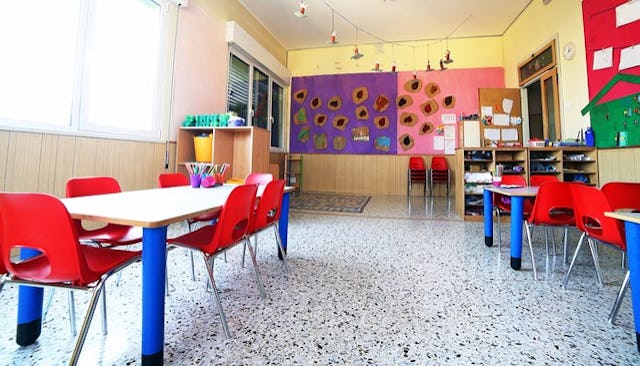Childcare Costs More Than College And Parents Are Drowning

There’s new information about childcare in America — and none of it’s good
It’s no secret to any working parent that the childcare situation in America is pretty much the worst. Between the astronomical cost and how difficult it is to find quality care, our country is failing its families. So, why isn’t it being fixed?
In a word? American parents are too damn busy surviving to demand action.
At least that’s what New York Times best-selling author Brigid Schulte claims in an essay for The Huffington Post. Her book about the struggle of working families, Overwhelmed: Work, Love & Play when No One has the Time, puts a spotlight on how difficult life is when juggling work and family. In her essay, she explains one of the reasons our lives as working parents are so hard to navigate, and it’s all about childcare.
She cites a report from The Care Index done in conjunction with non-partisan think tank New America that says three factors determine whether a state’s childcare system is effective: affordable cost, high quality and easy availability.
Spoiler alert: not a single state does well in all three categories. Which might explain the terrible situation we’re in as a nation in regard to working families and the kind of childcare they use. Or, don’t use, as some parents decide to just stay home because the cost of care is too high to make their salaries matter.
Greatest nation in the world though, right? Eye roll.
We have a long way to go as far as supporting families in this country and the first thing that needs fixing is the cost of care. It’s cost-prohibitive for many parents to send their kids to a quality daycare, with the average yearly price of full-time care for a child under age four being $9,589.
That’s more than the average cost of in-state college tuition.
For a parent earning minimum wage, that means two-thirds of their salary goes toward childcare. And that’s for only one child. It isn’t hard to see why some parents don’t work after having kids. It literally costs money to do so in many cases. And that’s simply unacceptable for a developed nation.
Yet, the terrible statistics and bullshit keep on coming with the cost of care being 85 percent of the monthly U.S. median cost of rent. This is unreal.
Quality is tough to measure, but Schulte notes that only 11% of childcare establishments are accredited by the National Association for the Education of the Young Child or the National Association for Family Child Care. I know firsthand that this quality metric drives up the cost of care — the very nice daycare center my kids attended as toddlers held these accreditations and was by far one of the most expensive we looked at.
And also, one of the only quality centers we toured that even had available spots for both of our small children (and even then, it was a month before we could send them both). Which brings us to the next issue of availability. Anecdotally, I can safely say this is an issue, as nearly all the centers we called to quiz about enrolling our kids had incredibly long waiting lists. One director literally laughed out loud when I said we would need care in the next month.
She laughed at us.
The statistics bear this out with one-fifth of families surveyed by Care.com claiming to have more than one childcare arrangement in a typical week, paid or unpaid. That means parents cobble together the days based on availability and probably use family to help fill in the blanks. For a time, my kids were in separate centers as the one we liked best only had room for our preschool-aged child. The other was still considered an infant and those spots are a lot harder to come by due to the ratio of teachers to children being lower. Yet another obstacle standing in our way.
In short, childcare is an enormous source of stress for working parents and as Schulte notes in her piece, not altogether effective for our kids. It costs too much, it’s scarcely available and the quality is not matching what we pay. And the reason we aren’t hearing more families rising up in protest, demanding a more comprehensive system with subsidies, better training for teachers and higher pay to attract quality teachers?
We don’t have time.
Working families are so busy trying to stay afloat and work through our inadequate care system to do anything to mobilize forces and change it. The need for change is very real, however, and we have a single presidential candidate who will give us any hope for a better future for working families — hint, her name doesn’t rhyme with “dump.”
Our vote next week matters, possibly more than it ever has. Let’s stop settling for less. Our kids deserve better — and so do we.
[free_ebook]
This article was originally published on